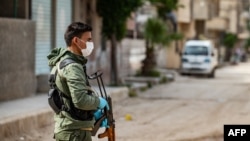Kurdish militiamen allied with the U.S. continue to battle Islamic State militants Saturday for control of a prison and surrounding areas of the northeastern Syrian town of Hasakah. Arab media reports that U.S. tanks and helicopters have arrived in the area to help Kurdish forces after IS took control of the prison and several adjacent neighborhoods Thursday. Dozens of Islamic State militants and Kurdish militiamen have been killed in the fighting.
Kurdish fighters from the U.S.-backed QSD militia traded arms fire Saturday with Islamic State militants, who continue to control the Goren Prison in the northeastern Syrian town of Hasakah and several districts near the prison. At least several dozen Kurdish militiamen and more than 50 Islamic state militants reportedly were killed.
Arab media showed video of U.S. tanks and armored personnel carriers arriving in the area surrounding the prison to help Kurdish forces in the fight to recapture the prison and adjacent neighborhoods.
Syrian government TV showed video of dozens of civilians fleeing their homes in areas surrounding the prison that IS prisoners had infiltrated. Part of Hasakah is under the control of Kurdish militia forces and another part of the city remains under Syrian government control.
Ramy Abdel Rahman of the Britain-based Syrian Observatory for Human Rights told Arab media that "U.S. Apache helicopters have destroyed a former government trade school building in which IS militants were hiding, killing at least five of them."
Abdel Rahman also accused the Syrian government of using the Islamic State prison breakout to try and expand its control over parts of Hasakah.
Tribal leaders in the region held a short press conference captured on amateur video in which they accused "[neighboring] Turkey of trying to use the Islamic State group to foment a conflict among ethnic and tribal groups in the north of Syria and in neighboring Iraq.
Islamic State militants also attacked an Iraqi Army outpost in Diyala province early Friday, killing 11 government soldiers. Families of the victims accused IS of killing the soldiers while they were asleep and disabling cameras in the area.
Khattar Abou Diab, who teaches political science at the University of Paris, tells VOA the prison breakout and battle for control of part of Hasakah is a crisis that has been brewing for a long time.
He says several thousand Islamic State prisoners were being held in an old government technical school that normally holds just a thousand people and that the Hasakah prison, as well as the more well-known al-Hol prison, have been breeding grounds for Islamic extremism. The current crisis, he argues, was just waiting to happen.
Saudi-owned al Arabiya TV broadcast a 2020 interview with an Islamic State prisoner in a Kurdish-run prison, claiming he intended to break out of the prison and that other Islamic State group members would "not allow their prisoners to remain jailed indefinitely."
One Syrian tribal leader asserted that the Kurdish militia that controls the prisons had "released many Islamic State prisoners," whom he claimed have "gone back to the areas they once controlled to try and stir up trouble."
Arab media accused several countries active inside Syria and Iraq of responsibility for supporting the Islamic State resurgence, but Khattar Abou Diab emphasizes "it is impossible to prove any of the accusations."




